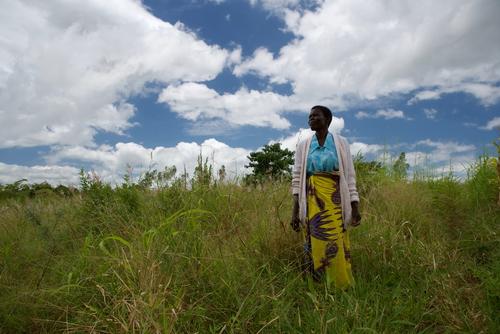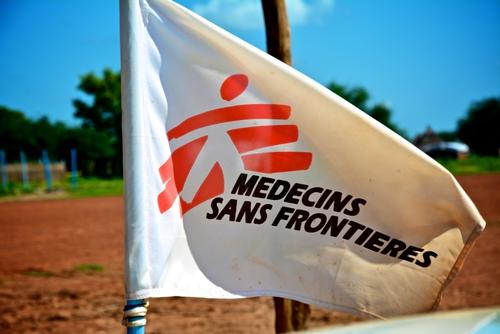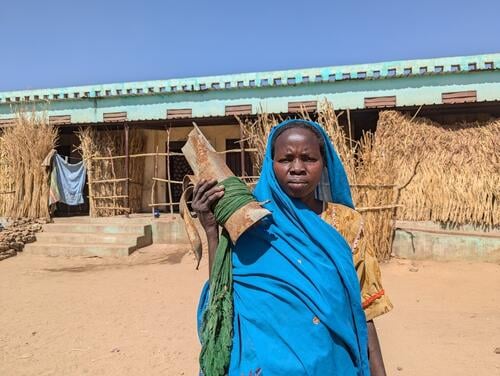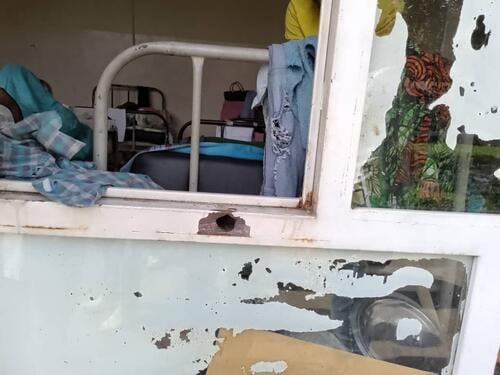A diagnosis of cancer is a life-changing event. In Ennerti Williams’ case, cervical cancer changed things in many ways: it affected not only her health, but also her ability to work and her family life in ways she could never have imagined.
“First, because of the sickness, I had to stop working – I was in too much pain,” Ennerti whispers, her voice barely audible above the clamour of the courtyard in Queen Elizabeth Central hospital in Blantyre, Malawi. “Without a job, I lost all my income. Then my husband left me. He didn’t see the point in staying with someone who was probably going to die soon.”
Up to that moment, 51-year-old Ennerti had lived all her life in Lilongwe, the capital of this small country wedged between larger neighbours in southern Africa. Before becoming sick, she had run what people here refer to as a ‘small-scale business’, which means whatever allows you to make ends meet: in her case, selling charcoal and phone credit.
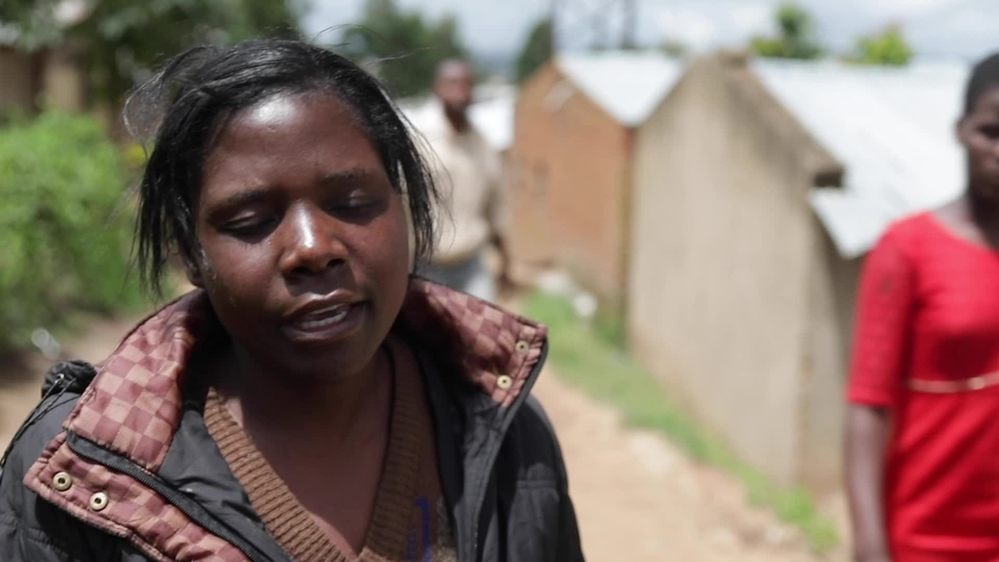
The women of Blantyre - cervical cancer in Malawi
Heavy death toll for a preventable disease
In 2018, Ennerti became one of more than 3,600 Malawian women who fall sick with cervical cancer every year. Two-thirds of them end up dying from the disease, the most common type of cancer among women in the country. It’s a heavy death toll for a disease that can be easily prevented through vaccination against human papilloma virus (HPV).
This is caused by a combination of factors: the vaccine is not widely available in Malawi; many women are diagnosed late; access to treatment is limited; and too often women cannot afford quality care. The high prevalence of HIV among the population only makes matters worse: for women living with HIV, the risk of developing cervical cancer is six-to-eight times higher compared to other women.
Ennerti initially tried to find effective treatment in Lilongwe, but it was not a success.
“The medication I was given didn’t seem to work, and the pain and the itching didn’t stop,” Ennerti says.
MSF teams provide free-of-charge cervical cancer treatment
Being out of a job and estranged from her husband, there was little to stop her from moving south to Blantyre after she heard that Médecins Sans Frontières (MSF) was running a free-of-charge cervical cancer programme with the national health authorities at Queen Elizabeth Central hospital.
“A religious group helped me to pay for the trip from Lilongwe to Blantyre, where I found accommodation with other members of my family,” Ennerti says. “I began chemotherapy cycles and received medication to stop the pain and the bleeding.”
Because of the sickness, I had to stop working... without a job, I lost all my income. Then my husband left me. He didn’t see the point in staying with someone who was probably going to die soon.Ennerti Williams, MSF cervical cancer patient in Blantyre, Malawi
MSF’s cervical cancer programme has been running since early 2018, initially offering screening, consultations and outpatient treatment for pre-cancerous and cancerous lesions. Since then, our activities have developed to include providing health promotion at community level, supporting vaccination efforts against HPV infection, specialised surgery, and providing palliative care for patients with advanced-stage cancer.
Access to advanced, free-of-charge surgery has been lifesaving for women like Madalo Gwaza, a 56-year-old tradeswoman from Monkey Bay, a village on Lake Malawi that she describes as “a beautiful place, where people come for fishing and swimming”.
Madalo’s small-scale business consisted of buying fish from local fishermen and selling it in the market, where she made a decent living. Madalo’s life changed drastically late in 2018, when she began to experience pain and vaginal bleeding.
“My symptoms kept getting worse and I had to stop working,” she says from her hospital bed in the surgical ward supervised by MSF, her words echoing those of many other women. “I was diagnosed with cervical cancer and had to make regular trips to Blantyre to undergo chemotherapy.”
High cost of cancer treatment adds to patients’ worries
“I quickly ran out of money,” Madalo says. “My eldest son helped me with his own savings, but I also had to borrow 25,000 kwacha [€30] from a loan group in my community, which I still don’t know whether I’ll be able to pay back.”
The cost of cervical cancer treatment is often prohibitive for women in Malawi, as many lose their sources of income because of physical pain and reduced mobility.
I quickly ran out of money... I had to borrow 25,000 kwacha [€30] from a loan group in my community, which I still don’t know whether I’ll be able to pay back.Madalo Gwaza, MSF cervical cancer patient
Malita Kulawale, a few beds away from Madalo, had a successful operation in early March and is now cured, but she faced many of the same problems as Madalo.
“I used to be a farmer, but the illness made it impossible for me to work in the fields,” says Malita. “I was prescribed a biopsy, but it cost 25,000 kwacha [€30] and I had no money. My brother, who has some livestock, had to sell a pig to pay for it, while my husband took on some farming jobs to help.”
Malita was diagnosed with cervical cancer in April 2019 and went through chemotherapy cycles for the rest of the year. When our teams opened a dedicated operating theatre, she had the chance to have surgery.
“I was told it would be a heavy operation: a complete removal of my uterus,” says Malita. “But I already had six children and knew that, at last, the operation would represent a solution – not just pain management, but the possibility of an actual cure. I was really happy.”
She is looking forward to regaining her strength and to the day when she can start farming again.
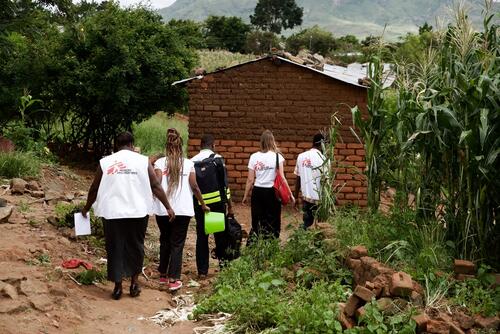
Providing palliative care and psychological support
In spite of all the difficulties they experienced, Malita and Madalo count themselves lucky for being among the few women who have managed to find effective treatment and be successfully cured of cervical cancer. Many women are not screened and diagnosed until is too late, when a curative treatment is no longer an option.
“When patients present with advanced-stage cancer, all we can do is to offer palliative care to manage physical pain, bleeding and other discharges,” says Jeroen Beijnsberger, who heads MSF’s onco-gynaecological programme in Blantyre. “It may not be a cure, but it’s a way to provide them with the best possible quality of life under the circumstances, until their final days.”
For many cervical cancer patients, and for those in the late stages of the disease in particular, bleeding and the smell from vaginal discharges add to the burden of their illness, leading to stigma and social exclusion. The experience of Ennerti, who was abandoned by her husband after falling sick with cervical cancer, is far from unusual.
Women with the disease are often perceived as being unable to fill their roles as wives and managers of the household, which can lead to problems within the family and community, for which they may need psychological support.
“Because of the combined toll of an incurable disease and the societal and familial issues stemming from it, psychosocial support is a critical component of palliative care,” says Beijnsberger.
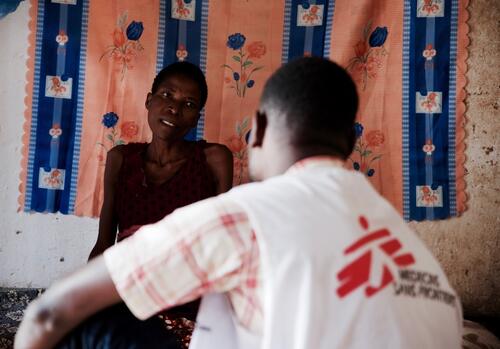
Suffering from advanced-stage cervical cancer, Magret Mafupa is so weak that she needs help to sit down on the floor of her daughter’s home in Ndirande, a small township in Blantyre district. She is visited most weeks by MSF nurses and social workers who check on her condition and provide her with medication.
“I can still walk a little, but very slowly and with some help” says Magret. “Luckily my mother and one of my daughters are here, while my other daughter sends me some money from South Africa, where she lives.”
When asked about her husband, Magret remains silent for a few seconds before saying softly that she’d rather not talk about it.
Before her illness, Magret was busy with a job that provided a good income for her and others in her extended family.
“I used to make trips to and from South Africa,” she says. “I packed some rice, fish and beans to sell over there, and came back with blankets, curtains and sometimes TV screens to sell here in Malawi. It was a good business; it allowed me to send my two daughters to school – one of them even went for higher education.”
All of that changed when she got sick and began to experience pain, bleeding and reduced mobility. The worsening symptoms persuaded her to go for cervical cancer screening in 2019, although she had received a negative test result only two years earlier.
“This time, they told me I had cancer,” Magret says.
Some women die; some miraculously survive
There is no easy way to tell someone they’re dying in any place or culture but telling women they have terminal cervical cancer is particularly challenging for MSF teams in Blantyre.
“You can’t just tell them – you have to break the bad news only partially and maybe leave the rest for another day,” explains Christopher Chalunda, an MSF nurse originally from this area. “We ask them how much they want to know about their condition, and some will say: ‘I know I have cancer, I don’t want to know anything else’.”
“At the end of the day, though, you must find a way to tell them,” says Chalunda. “They have to be aware. But you must give them time.”
Magret still hopes to recover, in spite of the advanced stage of the disease. Hope survives against all odds and sometimes miracles do happen. Elida Howa smiles as she sits under a tree just outside her house in Chileka, a rural area a short drive away from Blantyre, as she recalls her extraordinary story.
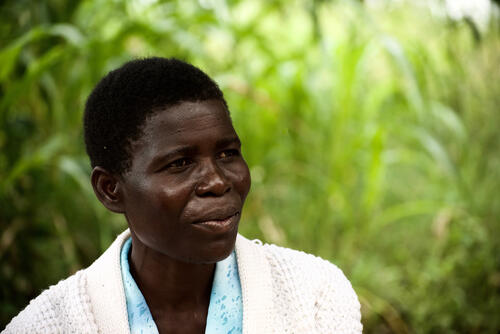
Elida’s story begins like many others: when pain and bleeding forced her to give up her work in the fields around her home, she went for a consultation.
“I was hospitalised in the oncology ward at Queen Elizabeth,” Elida says. “I felt weak, sick, I saw women dying in their beds near mine. My condition was so poor that even my mother told me I was just wasting her time.”
When Elida’s condition was deemed incurable, she was discharged and referred to MSF for home-based palliative care.
“I did not understand why they sent me home: I felt quite sick, I thought I still needed the hospital,” she says.
After four months of palliative chemotherapy, Elida’s condition improved beyond all expectations and, following a new assessment, she was offered curative surgery. Today she is free of cancer and looking forward to getting her old life back.
“I was afraid of the operation, I feared I would not come out of it alive,” she says. “But I am happy I did it and I’m well now, just waiting to be strong enough to go back to farming again.”

Next steps… and hope
A few days after our first encounter, Madalo Gwaza has undergone surgery and is doing well. After being discharged from hospital, she returned home to Monkey Bay on Lake Malawi. Her plan is to borrow more money to start trading in fish again, but she doesn’t know whether her plans will work out.
Ennerti Williams, meanwhile, is still waiting: she needs radiotherapy, which is not yet available in Malawi. The next step in our programme is to make radiotherapy accessible by facilitating transfers to neighbouring countries such as Zambia, where such facilities exist, but the arrival of the COVID-19 pandemic in Malawi is having an impact on the healthcare system as a whole, as well as on our activities.
Not only are plans on hold for cross-border radiotherapy for patients like Ennerti, but surgery has been limited to urgent cases only and home visits for palliative care patients have been suspended, in response to the need to minimise the risk of transmission.
“They told me I am on a waiting list for radiotherapy and I will go as soon as it will be possible,” says Ennerti. “I am waiting and hoping. I am optimistic.”



